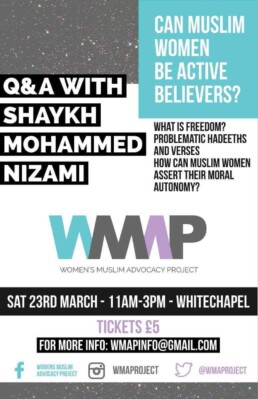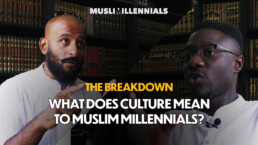The social practice of Qur'an khatms
Some people have asked about the social practice of ‘Qur'an khatms’, where people gather to finish the Qur'an (usually in an hour or so) and follow it up with a delicious feast.
This practice is more evident in some cultures than others, and much has been said against it and in defence of it, from it being encouraged to being considered a blameworthy innovation (bid’ah). I have no intention to get into the wrangling, and I feel that if we consider it with some common-sense reasoning (as God encourages us to do), we’d come to a reasonable conclusion.
Firstly, let's determine what exactly takes place:
1. Groups of people get together to hum Arabic for ambiguously defined ‘barakah’ (blessings).
2. It is claimed that the entire Qur'an will be read, yet each person simply hums their allotted small portion independently, so nobody actually reads the entire thing.
3. No guidance is taken from the book of guidance, nor is the Qur'an even understood - neither the allotted portion, nor in any holistic sense.
Personally, I find it deeply offensive to treat guidance and a message from God in this way. In any other context, would we take an informative and direction-giving letter sent to us, break it up into arbitrary parts, get a bunch of people to hum those parts to themselves in a language they little understand, and then bizarrely claim: 1. that we’ve read the entire letter, and 2. that the author of the letter not only wanted this but would be ecstatic about the strange thing we’ve just done? I think most of us would say no, and in any setting it would be deemed mockery.
Some will now more generally point to hadiths that discuss blessings of Qur'anic recitation. I hope it's becoming increasingly clearer that all of these narrations are in the context of the Qur'an being understood and such blessings (i.e. benefits) being the result of understanding, contemplation and practical application.
To be clear, I'm not negating reading the Qur'an individually or in a group, and those who sit with me witness the Qur'an's primacy in all things. I want us to do Qur'an more, not less, but certainly not as phonemes. Our homes and religious institutions should be alive with the sound of God’s guidance and deep explorations/contemplations on the divine word.
This is a message to all people, so that they may be warned by it, and know that He is the only God, and so that those who have minds may take heed.
Qur'an 14:52
Are you a Muslim or a Believer?
In the Qur’an God, speaks about faith/imaan from various perspectives. One that is highly relevant to the ways in which we identify faith and the faithful today lies in the Qur'an (49:14), where God distinguishes between 'Muslim’ as a political identity and those who truly believe.
The rise of delinquency
I once wrote on Twitter that extremists tend to present as complete dimwits, and although a couple of people mistakenly assumed I meant to lessen the danger they pose to all of us, I meant that they come across like baddies in a pantomime almost as if you can’t take them seriously. Whilst callous and dangerous, they almost have you believing that they’d trip over trying to tie their shoelaces. Tommy Robinson is convicted of, out of all things, mortgage fraud, whilst exposes have him discussing drugs and racial violence; interviews with EDL protestors are absolute car crashes; Anjem Choudhary performed like a parody of an imam, and the ISIS supporter Abu Haleema literally wore a tea towel on his head (with the M&S tag clearly visible) ranting incomprehensibly. The examples (across all types of extremists) are endless. But that’s only the small fish. Any video with Donald Trump, Boris Johnson or Nigel Farage is like a skit from a comedy show, not only the way they speak or what they speak about, but even how they behave. Today what we observe can only be described as absolutely surreal.
WMAP women's event
I would like to thank the WMAP team for organising the event they hosted last Saturday, and all those who participated in the gathering. There were many Muslim women in attendance from various walks of life: activists, homemakers, PhDs, doctoral students, professionals, civil servants, and so on. The two things that remained constant was intelligent thinking and a concern with what God wants, and as a result, all of our discussions were centred around the Qur'an and understanding what God has revealed.
The conversations were mature and enlightening, and rather than becoming an echo chamber in which grievances are simply listed, there was a keen and sincere desire to get to the core of God's expectations and problem-solve real life challenges. We spoke of God, scriptural understanding, cognitive dissonance from religious misguidance, a shari'ah that reflects divine wisdom and resonates with our God given intellects, how we might challenge illegitimate reactions to modernity that heavily bare down on women, ethno-cultural communities, cultural hegemony in a multicultural community, doing faith from first-principles, and identifying one's community and the need to form one for like-minded individuals.
Pertinent to the engagement is the fact that "The hypocrites, both men and women, are from the same ilk" (Q 9:67) yet "the believers, both men and women, support each other." The hypocrites "order what is wrong and forbid what is right; they are tight-fisted. They have ignored God, so He has ignored them" but the believers "order what is right and forbid what is wrong; they keep up the prayer and pay the prescribed alms; they obey God and His Messenger. God will give His mercy to such people: God is almighty and wise." (Q 9:71)
One attendee (who has memorised more than a third of the Qur'an) wrote:
“I thought the event was great. I feel that us muslim women have been so bruised and attacked by the media, patriarchy, culture, you name it - we have constantly had to fold ourselves, disappear, end up being reactionary or do whatever to survive. Also women policing women has hurt us. You recognised this, shed light on all this and called a spade a spade which kind of helped us put our guard down. Rarely has Islamic scholarship been truly empowering in its language, stances and consideration to the needs of women. Though we women know intuitively that our deen is so empowering and transformative for us as female believers specifically- but haven’t come across a version so far that enables this. Women haven’t been spoken to respectfully and have been infantilised by scholars so even being spoken to properly was huge. Sitting and talking with you about God was very refreshing for this reason. You were giving us the tools e.g recognise that ayaat are linked, learn the bigger picture/full story not just see the 20 secs clip and automatically make a judgement, know that there is deeper meaning behind the ayaat gained from asbab unnoozool, linguistic analysis, using logic, supporting hadith. By analysing ayaat that some considered “problematic” we managed to see how to go about analysing the ayaat and decode the Words of God. Adding the social science bits enhanced the conversation ten fold. More questions were created than answered at some points. Sometimes it felt like you didn’t have an opinion on a topic or didn’t want to share it with us, but that's because we’ve been so used to black/white fatawa that someone discussing nuance and emphasising context is triggering. Loved that the conversation on “hijab” was that it is a whole attitude/mode of carrying yourself. Lol at equating hijab with classiness :) who doesn’t want to be classy? Your definition allowed for all types of women to have space in Islam/community.”
I ask God to guide us to what is upright and true.
God's standards in our understandings and practices
This post is about some of the responses I receive from both the laity and the clergy when speaking about shar'i matters in a holistic way.
Talking about "Muslim women"
In breaking down the term Muslim women, and understand how we might view the interests of believing women, the following points might provide a clear account:
1. The operative word in the term Muslim women is the word 'Muslim', one who seeks to be subservient to God as taught by Muhammad, in accordance with the creed of Abraham. The next word 'woman' informs us that she is speaking from a point of the experiences of such subservience to God as influenced by factors specific to womanhood (whatever that might mean in the context). Generally, that'll mean that the issues that most resonate with her are those to do with women, as well as those that are equally relevant to men and women (people often forget the second).
Islam and culture: Does Islamic culture exist?
In this first instalment, Muslim Millennials (breakdown series) sat with Shaykh Mohammed Nizami discussing issues around religion and culture.
Articulating beliefs in the modern context
When discussing entities of a metaphysical nature our presentations tend to be abstract, binary and devoid of real-world meaning. Often it is absurdly supposed that simply saying something stands as evidence for its existence. With the current political backdrop that frames Muslims with the lens of securitisation, many believers have come to take what they view as a muscular approach to belief – that we believe in metaphysical entities because we must, and no one shall tell us otherwise; like those who insist that we accept militant secularism, both are allergic to debate and discussion. Whilst we might comprehend the reasons behind why some Muslims take this approach, it does not mean that it is correct.
Are long moustaches haram? The long and short of it
I frequently highlight the prevalence of shar'i ignorance, and that it's usually those who believe they're the vanguards of the shari'ah that cause the most religious problems amongst committed Muslims. Pointing out something is fine depending on how you do it, but unless it's on a qat'i matter, laymen ought to keep their advice to themselves. The culture of misinformed zealotry causes dissonance amongst believers plus it's emotionally taxing; micro-aggressions compound to the extent that it causes Muslims to dislike one another and lead many to doubt the edifice of the shari’ah because it's consequently portrayed as ridiculously petty and dull. One of the purposes of this article is to show how shar’i ignorance, cultural imposition, and fiqh intolerance often turn mundane issues into being perceived as colossal religious ones, when in reality a little common sense goes a long way and tends to put matters into perspective.
The convert's dilemma: Is this really the religion I converted to?
Did you convert to Islam with the beautifully simplistic idea of tawhīd, the way of the prophets, and a commitment to the word of God?
But as time has gone on, have you been opted into beliefs and practices that don't entirely make sense, nor resonate with the outlook that compelled you to convert in the first place?
Do you yearn for an inspiring way to envision your relationship with God and confidently understand what He wants from you?
We want to organise an informal event for converts during the holidays, where we can intelligently discuss issues with a British scholar, and where the discussion is led by questions from attendees. We all have loads of questions that are rarely answered satisfactorily, speaks to our (western) experiences, and is clearly explained through engaging with what God has directly said.
TO BOOK, CLICK HERE.
Please note:
- This event is for converts.
- Men and women welcome (which shouldn't have to be said!).
- Closer to the time, we'll send you precise details of the venue in Whitechapel.
- Booking is both to make sure you get a seat and to let us know if people are interested. Please be mindful of others and book only if you can 100% commit to attending. Spaces are limited so you'd be taking up the seat of someone who really wants/needs to be there. It's also important to note that significant non-attendance will mean organising future events will prove unfeasible. We thank you in advance for being considerate and pray God grant you happiness and contentment.
For more information, or if you have any questions, please contact: adhnan.ahmed@outlook.com











